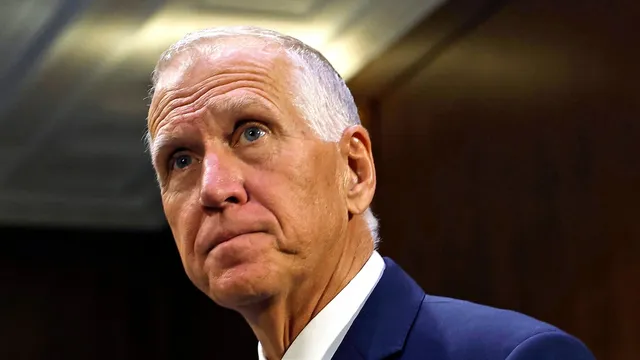
Thom Tillis won't seek reelection after Trump pressure
2025-06-30 11:58- Thom Tillis voted against advancing a major spending bill promoted by President Trump due to concerns over Medicaid cuts.
- Trump's criticism and threat to support primary challengers prompted Tillis to announce he would not seek reelection.
- This decision opens a crucial Senate seat in North Carolina ahead of the 2026 elections.
Express your sentiment!
Insights
In the United States, Republican Senator Thom Tillis of North Carolina declared on June 29, 2025, that he would not pursue reelection in 2026. His announcement followed closely after he voted against advancing President Donald Trump's ambitious spending bill, which faced criticism for proposed cuts to Medicaid. Tillis expressed concerns about how these cuts could adversely affect his constituents' access to healthcare. These votes drew the ire of Trump, who indicated he would support primary challengers against Tillis as retaliation for his opposition to the bill. Tillis stated that he would rather spend time with his family than navigate Washington's political landscape. In his announcement, Tillis remarked on the diminishing presence of bipartisan cooperation and independent thought in politics, suggesting that figures willing to cross party lines have become increasingly rare. His decision reverberates through North Carolina's political sphere, opening up a critical Senate seat in the state, historically favorable to Republicans. National Republican leaders emphasized the importance of retaining this seat for the party's future competition in the Senate, where maintaining a majority remains essential. As the Republican Party gears up for the upcoming elections, multiple candidates are expected to enter the race for Tillis's seat. Early indications suggest that Trump remains a significant influence within the Republican voter base, and potential challengers may seek to align closely with his policies. Democrats, encouraged by the vacancy, are also considering various candidates, focusing on a state that has seen a mix of Republican and Democratic leadership in recent years. In conclusion, Tillis's decision not to run again underscores the shifting dynamics within the GOP, particularly concerning alliances and candidate selections in light of Trump's ongoing influence. This development will likely shape campaign strategies and voter sentiments in North Carolina and beyond as both parties look to capitalize on the changing political landscape ahead of the 2026 elections.
Contexts
The impact of Donald Trump's endorsement in Republican primaries has been a subject of significant analysis and discussion, particularly since his rise to prominence in the GOP. Trump's endorsements have demonstrated a unique capacity to shape electoral outcomes, primarily due to his strong influence over the party's base, which is characterized by a fervent loyalty to his brand of politics. Candidates endorsed by Trump often see a substantial boost in their visibility and fundraising abilities, which can be pivotal in primary contests that are frequently decided by narrow margins. This phenomenon reflects a shift in the Republican Party, where personal loyalty to a figure like Trump has begun to outweigh traditional party affiliations or adherence to conservative ideologies that once dominated the selection of candidates during primary elections. Research indicates that Trump's endorsement not only increases a candidate's chances of winning their primary but can also consolidate support among various factions within the party. By rallying different groups around a single candidate, Trump's backing can help unify the party, which has been fragmented on numerous occasions. The endorsements serve a dual purpose: they signify to voters that a candidate aligns with Trump's policies and ideology, and they harness Trump's considerable grassroots organization and fundraising capabilities, which are essential for success in increasingly competitive primaries. Moreover, the long-term implications of Trump's endorsement pattern cannot be understated. His influence tends to create a cyclical effect wherein candidates seeking to run for office first seek Trump's approval to enhance their desirability. This trend suggests that future candidates may feel compelled to adopt more extreme positions that align with Trump's controversial stances, as a strategic move to secure endorsements. Such a shift could further entrench the division between moderate and more radical elements of the party, leading to an evolving GOP landscape that oscillates around Trump's ideology. However, the implications extend beyond intraparty dynamics; Trump's endorsement can attract significant media attention and generate heightened interest from voters, further amplifying an endorsed candidate's message. Candidates that embody Trump's persona, even if they carry different personal or political backgrounds, tend to capture his supporters’ imagination. This effect speaks to a broader transformation within the Republican electorate, where the alignment with Trump's rhetoric and approach is becoming increasingly necessary for any candidate aiming to be competitive in the primary electoral arena. Moving forward, understanding the nuanced impact of Trump's endorsements will be crucial for analysts and political strategists seeking to navigate the evolving challenges and opportunities within the Republican primaries.